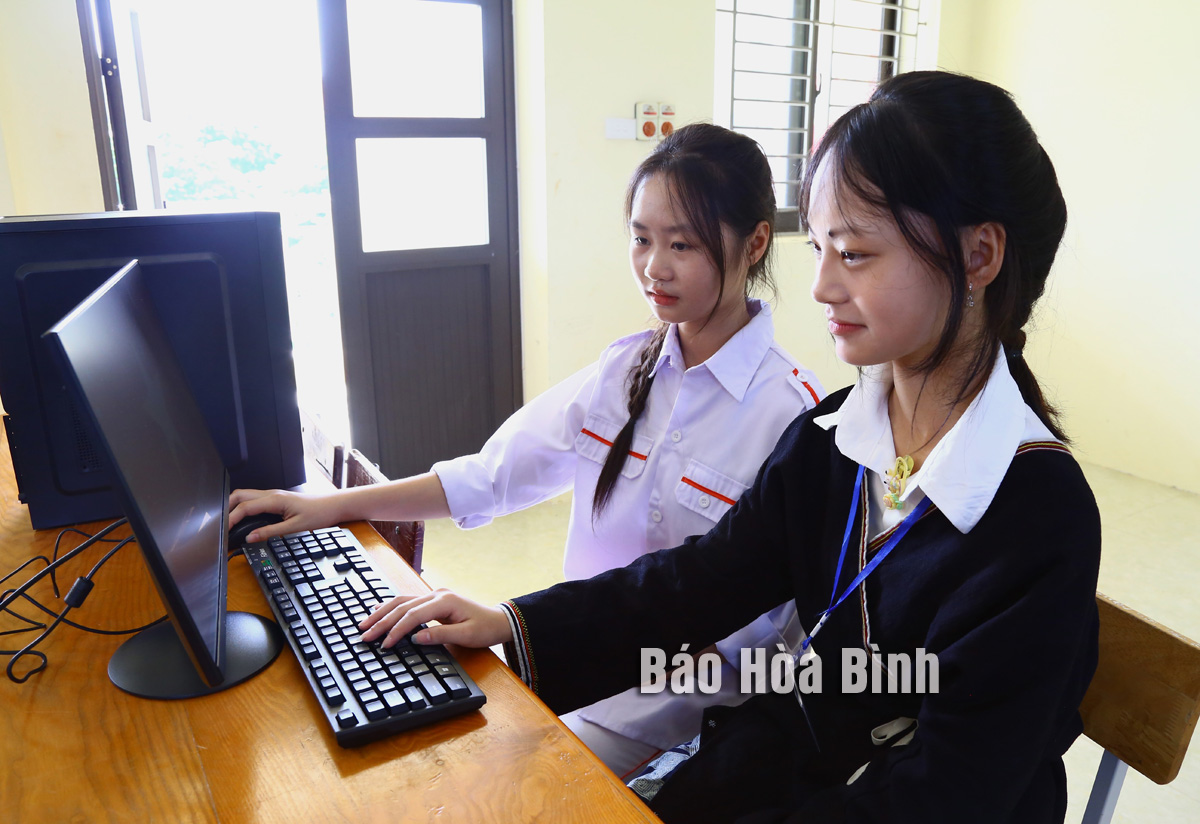
Since 2022, the Hoa Binh Department of Education and Training has provided advice for the provincial People's Committee to issue Plan No. 219/KH-UBND on November 17, 2022, which outlines the implementation of a project titled "Enhancing the application of Information Technology (IT) and Digital Transformation in Education and Training for the 2022–2025 period, with a vision to 2030.” As of now, the local education sector has made significant progress in IT adoption and digital transformation.
The application of information technology in schools contributes to improving the quality of teaching and learning.
Nguyen Quang Minh, Deputy Director of the Department, said that each year the education sector introduces guidelines to implement IT applications, digital transformation, and education statistics. These themes are integrated into professional training workshops, significantly enhancing the quality of teaching and learning across the sector.
The department has collaborated with Quang Ich Technology JSC to develop the Hoa Binh Education Database and Smart Education Ecosystem. Currently, 98.4% of student, staff, and teacher data has been synchronised with the national population database. The education sector is also leveraging platforms such as eNetViet, which bridges families and schools, while digitalising records, creating digital libraries, and deploying tools in the Smart Education Ecosystem to ease administrative workloads for schools and teachers.
Under the Ministry of Education and Training's guidance, the department has facilitated online university and college admissions through the Public Service Portal. In 2023, 8,364 candidates registered via the portal, representing 86.03%, and this increased to 9,087 candidates in 2024, equivalent to 91.42%.
In line with Prime Minister Directive No. 04, which promotes the use of data applications, identification, and electronic authentication for national digital transformation, the department has piloted digital academic records for primary schools. Consequently, 63,511 digital records, representing 99.34% of students from first to fourth grade, have been issued. This exceeds the minimum 50% requirement set by the Prime Minister and the Ministry of Education and Training. The remaining 419 students, accounting for 0.66%, are still awaiting digital records due to data inconsistencies with the national database.
The department has also introduced non-cash payment systems for tuition and other school fees. In collaboration with MISA joint Stock Company and commercial banks, the initiative has seen non-cash transactions surpass 83 billion VND (3.2 million USD) for the 2024–2025 school year as of December 8, 2024.
For digital public service signatures, all 520 public schools have been equipped, with 18,073 out of 19,002 public school staff members—95.11%—adopting the system. Additionally, all 12 non-public institutions and 535 non-public staff have implemented digital signatures.
Efforts to enhance IT and digital transformation in teaching and learning have also gained momentum. Teachers from preschool to high school levels receive annual digital transformation training. The department is working closely with the STEM Education Promotion Alliance and non-governmental organisations to expand STEM education. Notably, artificial intelligence (AI), robotics, and augmented reality are increasingly being applied to support teachers and students in their teaching and learning processes.
In recent years, collaboration with The Dariu Foundation has led to the establishment of over 200 programming and STEM clubs, which have delivered effective results. Products developed by these clubs have competed in national and international science and technology competitions, achieving outstanding accolades. For instance, teams from Cong Nghiep High School and Hoang Van Thu High School for the Gifted won three gold medals at the 2022 World Invention Creativity Olympic in the Republic of Korea.
Mai Chau district has firmly established itself as a standout destination on Vietnam’s tourism map, attracting both domestic and international visitors with its breathtaking landscapes, rich ethnic culture, and warm hospitality. However, beyond its natural and cultural charm, a secure and well-managed tourism environment has added to Mai Chau’s appeal.
As Vietnam enters a new phase of economic and administrative reform in 2025, Hoa Binh province is stepping up its efforts to streamline governance, boost economic growth, and attract investment.
The Hoa Binh provincial People's Committee held its monthly meeting on March 26 to review the progress of key projects, assess budget revenue and public investment disbursement, provide feedback on draft documents for submission to the provincial Party Committee's Standing Board, and discuss other important matters related to the committee's governance activities.
Playing a key role in Hoa Binh province’s economic development, Luong Son district has been focusing on science and technology development, innovation, and digital transformation.
Identifying the application of online public services as a key step in administrative procedure reform and e-government building, Kim Boi district has proactively provided services and supported residents and businesses in accessing and utilising full-process online public services promptly and efficiently. The locality aims to lift the rate of end-to-end online public services to over 90%, with all officials and civil servants handling tasks in the digital environment.
Nguyen Anh Tuyet, hailing from a family steeped in the ancient art of herbal medicine, is transforming local medicinal herbs into high-value concentrated extracts, elevating their worth and healing potential.



